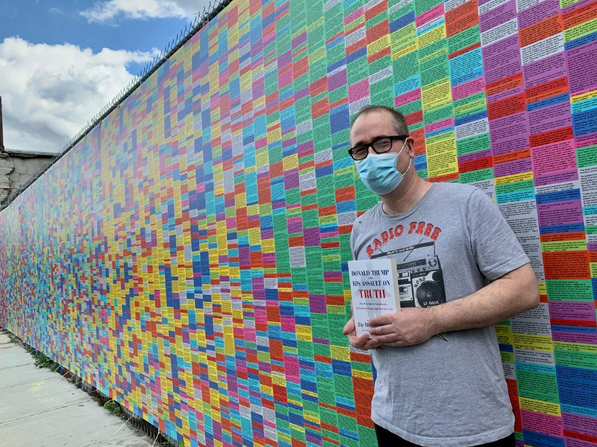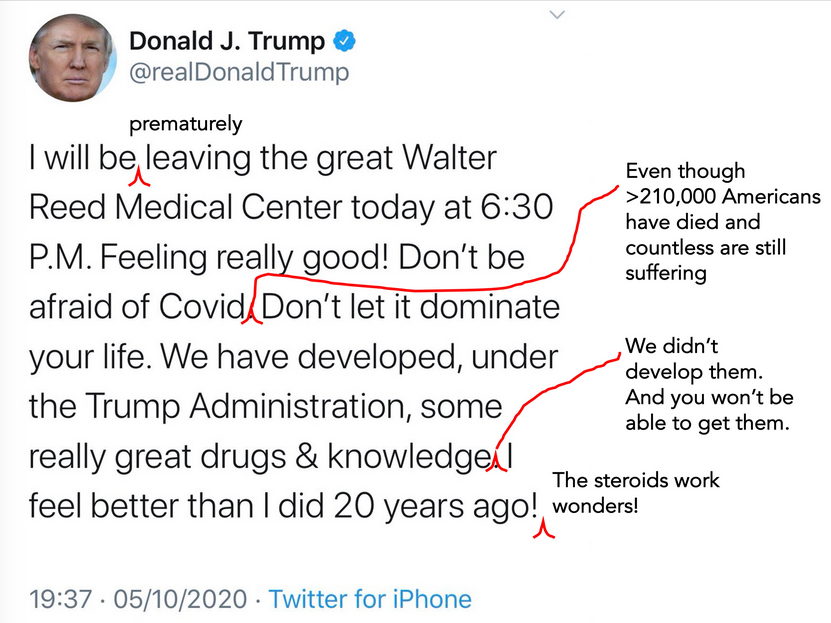Over the weekend, reporters tried to get the answer to a seemingly simple question: How is the president doing? But since Donald Trump’s COVID-19 diagnosis last week, we’ve learned how complicated the answer can be. On Saturday, Trump was said to be doing well. And then came reports he’d required supplemental oxygen and had a fever, after which Trump himself started releasing videos to prove how well he was. Eventually, on Sunday afternoon, the president convinced his doctors to let him ride around Walter Reed Medical Center and wave to supporters outside. And still, if you were watching, you might have asked yourself: How is the president doing?
Because when it comes to claims about Trump’s health, the first story hasn’t ever been the real story. It’s always been the sell. And as the president keeps selling the American people on his health, what we know is: Even if he’s doing fantastically well, he has an extremely infectious virus and could be infecting others. Slate’s Will Saletan says this matches up with everything we know about Trump: “He doesn’t think about other people. He thinks only about himself.”
While a lot of people are thinking about what happens if Trump takes a turn for the worse, Saletan has been thinking about what we’re left with if Trump recovers. I spoke with him on Sunday afternoon about what we really know about Trump’s illness and what it means for the rest of us. Our conversation has been edited and condensed for clarity.
Mary Harris: Can we just talk about this wild ride of misinformation we ’ ve been on?
Will Saletan: From an ordinary person’s point of view, you might think, OK, I don’t want to hear from the political spin people in the White House. I don’t want to hear from the Republican Party. I don’t want to hear from Trump himself. I want to hear from doctors, because doctors tell the truth. Actually, it turns out that doctors can spin just like everyone else. And these doctors have.
I shouldn’t say doctors, plural. There is one doctor, Trump’s physician, Sean Conley, who has given a couple of press conferences. And in the first one on Saturday, he spun. There’s not a nicer way to put it. He was asked directly several times whether Donald Trump had received oxygen, which is something one often needs due to COVID.
And it can indicate more severe illness.
Yes, it can. Conley was asked several times at the briefing at Walter Reed on Saturday whether Trump had received oxygen—specific questions about which days. And he hedges. Well, now it turns out that Trump did receive oxygen on Friday. So here you have a physician trying to avoid telling the truth in a way that we normally associate with political operatives.
Right after the doctor says everything’s looking great, the president’s in great shape, White House chief of staff Mark Meadows comes out and says, actually, it was a little touch-and-go on Friday, and we’re not quite out of the woods yet. A little bit later he says, but the president is great now. And it’s kind of this other layer of conflicting information where you just truly don’t know who to believe.
There’s really no one here you can trust and certainly not Mark Meadows, who, as you point out, has given different versions of events.
One of the lessons of the last few days is that we are learning things in the media from unnamed sources first, and then the White House is coming forward and confirming what various members of the media have learned. For instance, we learned that the president was on oxygen and was unwell on Friday from unnamed sources who spoke to the Times. And then a day or so later, you get the confirmation.
We get this from the media, and the media get it from the anonymous sources, who are, by the way, people in the White House or people around the president. And then we have the bizarre spectacle of Trump advisers denying information that they’ve given on background. So these people are putting out information anonymously, then challenging the media to prove it. When you hear the Trump campaign and Trump talking about fake news and it’s anonymous sources, it’s them . It’s their own people. And then they come out and they accuse us of fake news because our sources are anonymous. That is absolutely infuriating.
I don ’ t get why the White House would do this? It just makes them seem incompetent. And I ’ m just not sure about the strategy. C learly, the president was unhappy with the idea that people knew that he was unwell , but I just don ’ t understand what the play is here.
Well, they’ve gotten away with this for so long. The virus is the first thing that came along that just didn’t care what Donald Trump said. It’s just a virus. It’s going to infect as many people as it can. It can’t be cowed. It can’t be spun. And it can’t be snowed. It’s not some foreign leader who can be bullied. It’s not some Trump voter who doesn’t care what the actual economic numbers are. It just infects and kills whoever it can kill. So, the Trump strategy of lying and of denying, which has worked on other issues, just isn’t working on this one.
The death toll is unbelievable. Think back: Less than 3,000 people were killed on 9/11, and Trump said that that was an outrage and George W. Bush should be held accountable for it. We are over 200,000. We are in six figures of deaths. And Trump is still going, incredibly, with this strategy of “don’t pay attention to that.” He’s asking people to basically ignore it.
It stood out to me that we’re at this particular moment in the presidency where so many people who might have stood up and said, Hey, we need to do things differently are out and they’ve been replaced by people who are yes men. And that means that in a situation like this, it’s just especially precarious.
Part of what’s going on at this point is this gradual filtration effect. There used to be people who stood up to Trump. Famously, his former chief of staff, John Kelly, told the president that if he surrounded himself with yes men he would end up getting impeached. Well, that was proved quite prescient. He was impeached. So gradually, the people who stood up to him have been removed. And the people who remain are those who tell him what he wants to hear.
Part of what is so grotesque about what’s happened here with the infections is that it reflects the larger pattern of the Trump family thinking they’re immune, thinking they don’t have to follow the same rules as other people. We have the debate in Cleveland on Tuesday where everyone was supposed to wear a mask. The Biden people at the debate wore a mask. The Trump family took their masks off. They thought that that wasn’t necessary for them. The rules didn’t apply to them. And they thought they were protected from that.
What I think is going to be the much larger scandal coming out of this is that on Thursday, after the White House knows that Hope Hicks, Trump’s senior adviser who has been very physically close to Trump and others, has been diagnosed with COVID, they go to Bedminster and Trump sits around a table at a fundraiser with people who have no idea that he has just been with someone who has just been diagnosed with the virus. And he exposes those people to the risk of the virus without their knowledge and just tries to hide it from them—to get money. To get money! He collects millions of dollars at this fundraiser in an extremely dangerous situation. He exempted himself from the rules so that he could go and collect that money. That, I believe, will be the largest scandal coming out of this.
How is catching the coronavirus good or bad for Trump politically? There is this idea that maybe it will generate sympathy and that could be part of reelecting him? Is that what you think too?
I think there is some sympathy for him. As soon as his infection was announced, there were people on Twitter on the left celebrating, and there were people like me who said, don’t celebrate. And Rachel Maddow saying, don’t celebrate. And Joe Biden saying, don’t celebrate. It’s unseemly. It’s inhumane to wish ill on anyone, including Donald Trump. What’s much more likely to hurt Donald Trump is that the focus of this conversation can shift, and I believe is shifting, from Donald Trump’s health situation and how he got infected to how he endangered and possibly infected others. That’s a completely different conversation. Donald Trump, God willing, will get better and will be back on the campaign trail. And then we will be left with the question of the measures that the White House failed to take and the protocols they violated: what Trump knew, when he knew it, and why he proceeded to endanger others, apparently for the sake of large campaign contributions in the form of these fundraisers.
And it keeps the coronavirus at the front of the news, which is something the president did not want.
Can we just stand back and say how bizarre it is that we have anonymous quotes from people who work for Donald Trump talking about how they want to keep the coronavirus out of the news? A thing that has killed more than 200,000 Americans. And they’re just openly saying we’re trying to get people to ignore this. It is a grotesque campaign strategy. To some extent it has worked, but I think it’s running out. Their failure to control the virus, their attempt to wish it away and to hide it is failing.
We should say that all presidents try to keep information about their health away from the public. What do you think it is that makes this circumstance different?
I can’t think of another case where the medical threat to the president was a threat to other people as a result of his actions. To me, that’s the fundamental distinction. You’re absolutely right that presidents have tried to hide health problems. I believe in every one of those cases it has simply been a matter where the president may have been incapacitated in some way when there may have been a national security risk and we weren’t told. They can say in those situations, Hey, we didn’t want the Russians or the Chinese or some other nefarious enemy to know that for those five hours the vice president was in control or whatever it was . But this is different because I just keep thinking of Trump sitting around a table with these Republican donors in New Jersey, some of whom are in the high-risk group. This is not like the president has a cardiac problem. This is that the president has an infectious disease and hiding that is just the height of irresponsibility.


 this is it right here, this is a huge national security problem. Probably the worst national security problem ever.
this is it right here, this is a huge national security problem. Probably the worst national security problem ever.